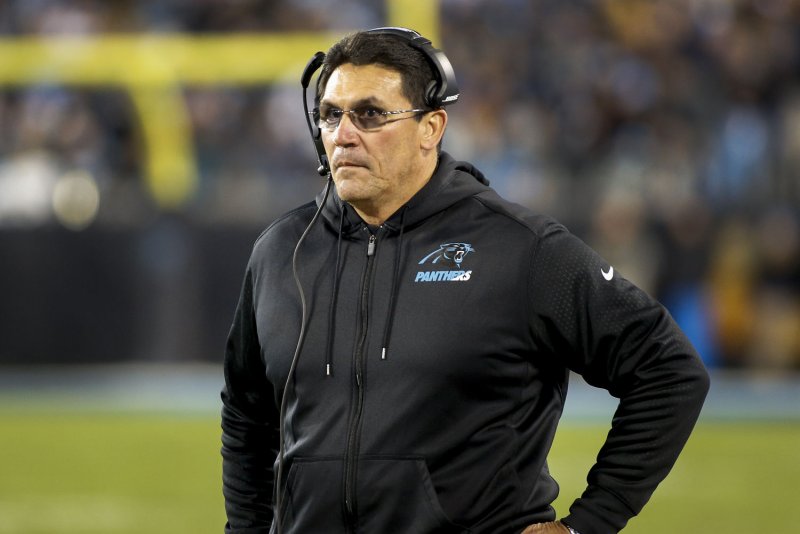1 of 3 | Carolina Panthers coach Ron Rivera stares at an official as his team plays the Tampa Bay Buccaneers in an NFL football game at Bank of America Stadium in Charlotte, North Carolina on January 3, 2016.Carolina won 38-10. UPI/Nell Redmond . |
License Photo
For only the fourth time in 50 years, two long-time former players will be the opposing coaches in the Super Bowl. And in the way that Ron Rivera and Gary Kubiak manage their teams, there is a message that coaches who want to follow them need to heed.
We're talking to you, Chip Kelly, but you're not the only one.
To be successful, a coach has to be willing to move out of his comfort zone, whether it is offense or defense, and figure out the other side of the ball.
Bill Belichick did that a zillion years ago, and despite what happened in Denver, the results seem to indicate he did it pretty well.
Simply, offense and defense have to work together to make a team successful. It did not happen with Kelly's teams in Philadelphia, and unless he understands that running an offense with the lowest time of possession in the league is not helpful to his defense, he will come to the same end in San Francisco that he did with the Eagles.
Rivera is a good defensive coach with a great background weaned playing for the Mike Ditka-Buddy Ryan Chicago Bears of the 1980s.
Sometimes, coaches with a background on defense put their offense in a straitjacket, and beat themselves.
Rivera has not done that. As a player, he was part of a defense that shut down great offensive teams from San Francisco and Washington. And he knew he had a special talent in quarterback Cam Newton, so he gave offensive coordinator Mike Shula plenty of latitude.
There were no worries about the offense being too wide open and perhaps creating problems for the defense with turnovers or other issues. And the result? Carolina led the league in scoring, finished second to Denver in yards per play and had the league's best turnover differential.
And the defense? Well, you might have seen what it did to Arizona, the league's No. 1 offensive team, based on yards per game. Clearly, Rivera learned something about offense while he was coaching defense.
Likewise, Kubiak, once John Elway's backup quarterback with the Broncos and now the coach working for general manager Elway with the Broncos, knew he had to compensate for offensive shortcomings this year because of Peyton Manning's injury issues.
As an NFL quarterback, Kubiak learned about defenses by playing against them -- and, for most of his career with the Broncos, he saw how the lack of a decent defense impacted a great quarterback (Elway, not Kubiak).
Now, as general manager, Elway provided him with the players, and they pulled Wade Phillips out of a year's retirement to run the defense.
Kubiak knew he had to tamp down his offensive instincts to help the defense, and he did, putting Manning under center instead of the shotgun more than in the past, and leaning heavily on the running game and the defense.
You saw what Denver's defense did to Tom Brady, and that was not an aberration. The Broncos allowed the fewest yards in the league during the regular season. They won the daily double, allowing the fewest rushing yards per play and also the fewest net passing yards per play. Oh, and they led the league in sacks per pass attempt.
If Denver had played defense like that during Elway's playing career, he might have won more than the two Lombardi trophies he embraced at the tail end. Worth noting, of course, is that Kubiak was the offensive coordinator for those two teams, and Kubiak's coaching mentor, Mike Shanahan, put together the kind of running game and defense that Elway's teams previously lacked.
Rivera's mentor, Ditka, was on the winning end of the last Super Bowl coached by two former long-time players, both Hall of Famers, in fact -- Ditka's Bears against Raymond Berry's New England Patriots 30 years ago. That one was notable for the defense Ryan coordinated for Ditka.
The other two matchups of long-time players-turned-coaches were the two Super Bowls between the Steelers and Cowboys in the '70s, with coaches Chuck Noll and Tom Landry. Both of them were longtime NFL players who earned their Hall of Fame chops as coaches, of course.
When he coached the 49ers to three Super Bowl titles in the '80s, Bill Walsh developed Joe Montana and introduced us to the West Coast offense. He didn't get as much credit for defense with those teams, but the 49ers had some vicious hitters in the secondary and always had a strong, deep defensive line. Remember, it was a goal-line stand that helped them beat Cincinnati in Super Bowl XVI.
The Giants' Bill Parcells was a defensive coach but his quarterback, Phil Simms, completed 22 of 25 passes in a Super Bowl victory. The Raiders' Tom Flores, like Parcells a two-time Super Bowl winner, had a background on offense but a defense that mauled opponents and a linebacker, Rod Martin, who intercepted three passes in Super Bowl XV.
It's a clear message. The most successful coaches made sure they learned, or had someone they could lean on to lead, the other side of the ball. That's something the Broncos and Panthers clearly have.
Ira Miller is an award-winning sportswriter who has covered the National Football League for more than four decades and is a member of the Pro Football Hall of Fame Selection Committee. He is a national columnist for The Sports Xchange.















